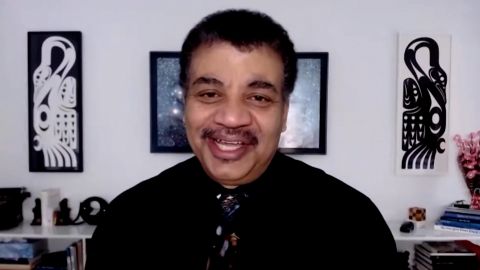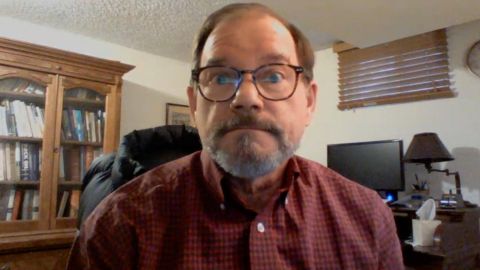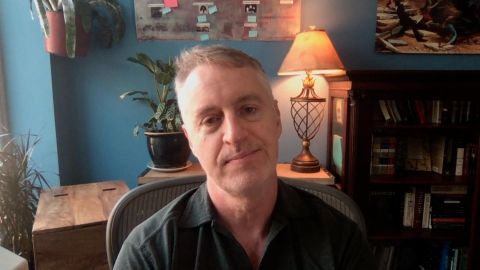Read Transcript EXPAND
CHRISTIANE AMANPOUR: So, why is the universe the way it is? How did life begin, and how might it end? Many of us have asked these questions at some point. And our next guest has spent his life trying to find the answers. Neil deGrasse Tyson is an astrophysicist, he’s an author and a popular science communicator. His new book is called “Cosmic Queries” and it’s co-authored with physicist, James Trefil. And he’s joining our Walter Isaacson to discuss the book and what drives his thirst to explore the really big questions of our universe.
(BEGIN VIDEO CLIP)
WALTER ISAACSON: Thank you, Christiane. And, Neil deGrasse Tyson, welcome to this show.
NEIL DEGRASSE TYSON, ASTROPHYSICIST AND AUTHOR OF “COSMIC QUERIES”: Thanks. Thanks, Walter. It’s always good to see you.
ISAACSON: You’ve just written a totally fascinating book, which also happens to be really gorgeous, about the big questions in our cosmos, big questions in our lives. What is the question you would most want to know the answer to?
TYSON: Thanks for asking that, because it’s — I have an un-orthodox reply. And if I can break the questions up into several categories, one of them — because this book is designed around questions, whether or not we have answers to them. Because these are questions that we’ve carried with us in civilization forever, like where did it all come from, what’s it all made of, what is our place in the universe, how will it all end? And some of those questions, we got that. We’ve got the answers. Others, we offer you some ideas that we have, but we’re not sure. There’s a whole other category of questions where we don’t even know if it’s the right question. And I’ll give a quick example. On Earth if you visit Santa Claus and you say, Santa, please point north to me. I want to keep going north. Every direction Santa will point is due south. Because Santa’s on the North Pole. Santa can’t point east or west even. So, the question which way is north on the North Pole has no meaning. Now, we know that, you have to think about it, but we know that in advance because we’ve set up the grid ourselves. But in space, on the frontier of inquiry, you don’t even know if your question is the right question. So, what’s the question I want most answered? It’s the question I don’t even yet know to ask. That’s what drives me.
ISAACSON: Let me ask a few that you ask in the book and see if you can sort of give us the short-form answer to them. What happened before the beginning of the universe, or is that a question that has no meaning, since time didn’t exist before the universe existed?
TYSON: So, the cop out answer is we’ve defined time as the beginning. So, to ask what’s before it would be like asking Santa Claus what is north of the North Pole? Because you hike your way as far north as you can, you’re done. So, I don’t mind that as an answer. But we have other ways of thinking about that question right now. For example, the full universe itself can contain pocket universes within it. This rolls out of our understandings of quantum physics as applied to early universe, astrophysics. When you merge those two, some interesting consequences unfold. And so, our universe could be a pocket. Our observable universe could be a pocket within multiple pockets, perhaps an infinite number of them. And we have a word for this, it’s called the multiverse. You’ve heard of this in science fiction. Is there a parallel universe there? All right. So, it may be that universes within a multiverse are being continually made. And our beginning, yes, it wouldn’t make sense to ask what was around before our universe in our universe. But time may go infinitely far in the past as a clock kept by the multiverse rather than by our own place within it. So, we’ve been exploring that lately. And, by the way, if there’s an infinite number of them, then all molecules and matter, atoms, will assemble in all possible ways. And that led to the idea that maybe you and I are having this conversation in that future, except maybe, you know, we’re 10 years older or 10 years younger or there’s some little difference about it. But — so, people like thinking — I think it’s their immortality urge, thinking of themselves co-existing in any of these other universes. And they would make interesting stories if we start visiting each other.
ISAACSON: Let me bring you back down to Earth, which is —
TYSON: No, no.
ISAACSON: With a big question, how did life begin?
TYSON: So, that’s another fascinating frontier. I mean, here we are on Earth. We had all the right ingredients, right as in the ingredients for biochemistry. So, the hydrogen, oxygen, carbon, nitrogen, phosphorous, all of these ingredients are part of the birth ingredients of our solar system. And, by the way, they’re common across the galaxy. So, that’s very important fact there. Then, these atoms make molecules, organic molecules. OK. But that happens spontaneously. We got this. Because they want to get together. All right. Carbon is a very sticky element. It’s in the presence of oxygen and other things, it’s going to stick to itself and stick to it. So, it’ll start growing molecules. So, the big question is, how do you go from inanimate molecules to self- replicating life? And that remains a frontier. Some of it has like a chicken and egg problem because the RNA makes the DNA but the DNA has to give instructions to make the RNA. And so, we have a lot of biologists scratching their heads right now. So, the way I talk about it is that it’s a frontier. And we’ve got top people working on it. So, I’m good with that. And often this is where someone who’s deeply religious might step in and say, well, you needed God for that. And, like I say, this book, “Cosmic Queries,” touches many questions that will touch people — will affect people, possibly religiously, definitely philosophically. And all I’m saying is that it’s the next frontier. Yes, we don’t have an answer yet, but are you going to say we’ll never have an answer without appealing to deity? I’m not prepared to say that. Because with top people working on hard problems throughout the history of science, we have solved problems.
ISAACSON: Let me ask you a question that Enrico Fermi asked, which is, where is everybody?
TYSON: That’s a really important question that Enrico Fermi, he’s a physicist back, you know, 70 years ago, 80 years ago. So, he was thinking about this, thinking about aliens. Where are they? If they’re anywhere in the galaxy. You can run a fast calculation and show that if you’re anywhere in the galaxy and you have technologies to expand to other planets, they would have expanded across the entire galaxy by now in the history of our galaxy. So, you can do that calculation and that’s what led him to that question. And so, now you have to ask, where are they? So, there’s several replies, several responses as we explore in the book. So, one of them is space travel is just too hard, really. It’s hard on everybody, not just hard on us. So, no, they didn’t become the multiplanet species. OK. That’s not good for science fiction storytelling, but it’s — I think it’s the lead answer. Another one might be, they did explore the galaxy, and they did have a go with Earth, took a look at us, and returned to their home planet reporting there’s no sign of intelligent life on Earth. OK. So, that would just be embarrassing for us that we wouldn’t even count as intelligence on their scale. But here’s another more intriguing possibility. That whatever is the urge that has you say, I want to colonize planets, whatever strand of DNA they’ve got that urges them to do this is incompatible with colonizing the entire galaxy. Why? Because as this strand of DNA manifests in everyone who’s doing this, there will come a point where they start competing for each other’s planets and they start fighting, I want that planet because I am the colonist. And then they implode out of their selfishness. And they say, come on, they’re aliens. No, excuse me, that happened on Earth. How far back do you have to go? Spain, Portugal, France, England, they’re colonizing the world, sending their ships and their armies, doing land grabs around the world. And then what happens? They end up fighting with each other. And then the whole system of colonization implodes. That happened here on Earth. It’s not a stretch. So, maybe the urge to do that is self-limiting of your capacity to succeed with that ambition.
ISAACSON: Do you think there is life on other planets?
TYSON: Often when people ask that question, they are thinking about intelligent life, you know, with ray guns and things. If you’re a biologist, you’re looking for any life, microbial, anything that has a metabolism that we might recognize as life. And if you just look at the abundance of the native ingredients of life as we know it, you look at how fast life formed on Earth, you look at how many planets are now in the catalog, more than 4,000, and that’s just in our little pocket of the Milky Way Galaxy, you would be inexcusably egocentric to suggest that we are alone in the universe. And so, it’s these calculations that any one of us have made in astrophysics and astrobiology, a new field with the conjoined words of biology and astronomy, astrobiology. We all have confidence that there’s life out there for those reasons I just gave, and we should be looking for it. And so, that’s motivating these trips to Mars with rovers. These are biology and geology experiments loaded onto clad onto this mobile laboratory. And in the recent incarnation we even have a helicopter, love it, that goes up, and it can drop into craters and things that the rover cannot navigate. So, this search for life is motivated by the expectation that there’s life out there. And we look in our own solar system. First, we follow the water. Multiple places within our solar system have evidence for liquid water in them. And every place on Earth, every place on Earth where we find liquid water, we find life, even the dead sea. It was called the dead sea by people who didn’t have access to microscopes because they weren’t invented yet. It’s dead of vertebrate fishes, right. But pull out a drop of it, you’ll see microbes doing the backstroke.
ISAACSON: If I had one really big question that I’d love to know — have an answer to, it would be, why does the universe exist?
TYSON: So, when you cross from scientific inquiry to philosophical inquiry, and in many places, they overlap, you end up asking questions that contain the word why. And why is two-faced. All right. If something falls on of a shelf and breaks, you can say, well, why did it break? And I can say, well, when it was on the shelf, something lifted it there, gave it what’s called gravitational potential energy and that energy is just waiting to be manifested. You shove it off the shelf that, energy gets recovered, and it becomes kinetic energy. And on hitting the ground, that kinetic energy has to go somewhere. It goes back not object cracking it, destroying it. And I say, that is why it broke. All right. That’s a perfectly good answer to that why question. But then you could say, well, why is there gravity? All I can say, well, because there’s mass curve space and time according to Einstein and that mass tells space how to curve, and space tells matter how to move, and what we say is gravity, it’s just objects moving in the curvature of space. But then, why does matter do that to space? And you keep why’ing yourself down the line, and you get to a point where you’re really asking for motives. You know, why is there a universe? Why is any of this — and, OK, but if you want motive rather than just causes and effects, then you’re no longer in the realm of experimental science. You step into religion, and religion there are motives because God loves you, because Zeus commanded it, because — and then you’re — somehow, you’re good with that. What’s odd though, deeply religious people, I don’t see them asking, why is God — why does God exist? They don’t really ask that question. Why is Zeus throwing lightning bolts? He’s mad. Well, why is he mad or why does he get mad at all? Somehow the religious account satisfies people enough to not further ask questions deeper than that. What was around before the universe? I don’t know. Maybe the multiverse was always there. Well, something had to create it. But I say, what? And they say God. And then I ask, well, who created God? And they say, well, God always was. That’s the same answer I just gave you for the universe and somehow, you’re happy with that. So, that’s the interesting fact about certain categories of questions that have bedeviled civilization ever since antiquity.
ISAACSON: How will the universe end?
TYSON: I love the Robert Frost poem, and I always mangle, though I get two out of the three lines. It’s not with a bang but with a whimper. Not in fire but in ice. That’s accurate. And that is how it’s going to happen. So, yes, we’re expanding and cooling. And an interesting fact that if you ever let air out of a bicycle tire, the air that goes past your finger, it feels cooler than the air around you because that’s air under pressure that’s expanding cools spontaneously. And the air usually out of compressed cans feels cooler. So, expanding universe behaves similarly, as we expand the temperature’s dropping. Right now, it’s three degrees above absolute zero. It is cold in the depths of space. And it’ll keep getting colder. So, in the infinite future, all physical processes will cease. And all stars will die out and they will blink out one by one in the night sky. And the entire universe will just be a void. A void. That is sort of the most likely pathway given established physics. But there are others. And one that scares me, if you give me 30 seconds to describe it. This expansion of the universe is actually an acceleration. And if that acceleration goes unchecked, then in about 20 billion years from now, all galaxies will have expanded beyond our horizon. So, all of cosmology will go away because everything we know about the history of the universe comes from galaxies. Then, all stars in our night sky will expand, it’ll overcome the binding energy of our galaxy itself. Then it’ll overcome the binding energy of our molecules, stretching those apart. Then it will overcome the particles within the atoms and then the particles themselves. And then it’ll get to the very fabric, the very pixels of the universe itself. The very constituents that make up the space/time continuum and it’ll try to stretch that. And you can’t stretch that. The only thing that we know will happen to it is that it will rip. And I don’t even want to wonder what that means. It’s fabric. Every fabric has a stretching limit until it rips. In 20 billion years, that’s what will happen. The universe will rip. And it’s called the big rip. And I’m terrified of that. I’m glad I’ll be dead from a hundred other causes. Somebody — whoever’s around then, it’ll be a spectacular death. So — and in the book, we explore these many ways that science informs us of how the universe will end. But we’re not landing on any one of them just yet.
ISAACSON: Neil deGrasse Tyson, thank you so much for being with us.
TYSON: Thanks. Thanks for having me.
About This Episode EXPAND
Author Dave Cullen discusses yesterday’s shooting in Boulder, Colorado alongside Tom Mauser, the father of Columbine victim Daniel Mauser. UK Labour MP Jess Phillips discusses the epidemic of misogynistic violence. Astrophysicist Neil deGrasse Tyson joins Walter Isaacson to explain how his new book “Cosmic Queries” tackles some of science’s most perplexing questions.
LEARN MORE



